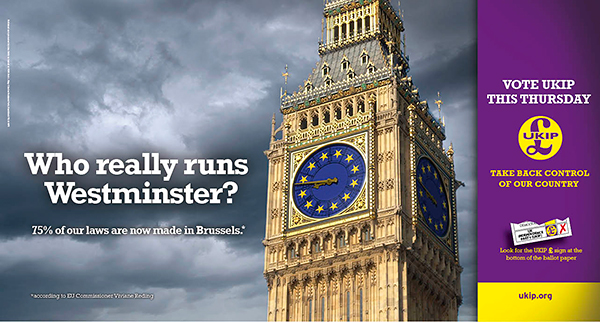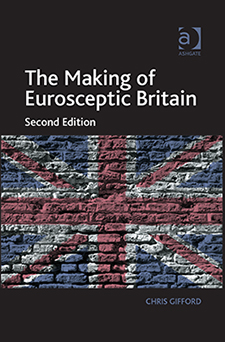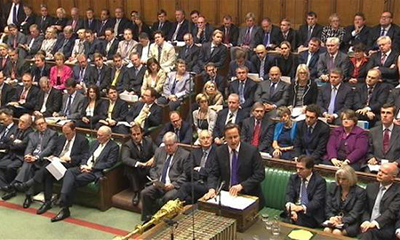General Election result signals a move to the UK’s Euroscepticism
 Pictured above is UKIP's final billboard poster of its European Election campaign, depicting the EU flag on the clock face of Big Ben, with the statement 'Vote UKIP on Thursday...Take Back Control of Our Country'.
Pictured above is UKIP's final billboard poster of its European Election campaign, depicting the EU flag on the clock face of Big Ben, with the statement 'Vote UKIP on Thursday...Take Back Control of Our Country'.
Fri, 08 May 2015 13:30:00 BST
Dr Chris Gifford’s revised book The Making of Eurosceptic Britain launched on the rise of anti-EU sentiment in Britain
 THE 2015 General Election was a “victory for Euroscepticism”, according to a politics expert at the University of Huddersfield who is the author of a freshly updated book on the rise of anti-EU sentiment in Britain.
THE 2015 General Election was a “victory for Euroscepticism”, according to a politics expert at the University of Huddersfield who is the author of a freshly updated book on the rise of anti-EU sentiment in Britain.
UKIP did not make major inroads in terms of Parliamentary seats, but gained more than 12 per cent of the popular vote. And a Conservative victory means that an in/out referendum is a certainty for 2017.
“Also, the fact that David Cameron has a very small majority means his Eurosceptic backbenchers, many of whom want complete withdrawal from the EU, are going to have a strong voice in the Parliamentary party and have an influence on Government,” said Dr Chris Gifford (pictured left).
 He is Head of the Department of Behavioural and Social Sciences at the University of Huddersfield, and his book The Making of Eurosceptic Britain (pictured right), first published in 2008, has now been revised to take in developments such as Eurozone crisis.
He is Head of the Department of Behavioural and Social Sciences at the University of Huddersfield, and his book The Making of Eurosceptic Britain (pictured right), first published in 2008, has now been revised to take in developments such as Eurozone crisis.
The Prime Minister’s Eurosceptic backbenchers will closely monitor and influence his attempts to negotiate with the EU, said Dr Gifford.
“They will keep a careful eye on what he is achieving in the European Union so that they get the kinds of reforms that they want, which includes some kind of repatriation of powers and restriction on the free movement of people.
“We have had an election that further embeds Euroscepticism in the political system,” concluded Dr Gifford.
Euroscepticism growing amongst the electorate
His newly-revised book examines issues such as the political impact in the UK of the Eurozone debt crisis and asks if bank collapses and bailouts reinforced Britain’s Eurosceptic trajectory.
The Making of Eurosceptic Britain examines the extent to which Euroscepticism has become dominant within both the Conservative leadership and the bulk of its parliamentary party and how this affected the relationship of the Conservative-Liberal Democrat coalition government with the European Union.
Dr Gifford argues in the book that British Euroscepticism is structural in nature and a persistent and institutionalised feature of UK Politics.
 The Prime Minister's Eurosceptic backbenchers will be closely monitoring his attempts to negotiate with the EU.
The Prime Minister's Eurosceptic backbenchers will be closely monitoring his attempts to negotiate with the EU.
Now the 2015 Election has added extra impetus to his analysis. UKIP took votes from both Tory and Labour supporters, he says, and the issue of immigration, especially from Central and Eastern Europe, has meant that Euroscepticism has become increasingly salient to large numbers of the electorate.
“UKIP has built a narrative that appeals to a certain section of the population,” said Dr Gifford. “This is the idea is that Britain is a country in decline, symbolised by giving power to Europe, and letting too many immigrants. People’s values and sense of belonging are increasingly being threatened and UKIP is capitalising on those feelings.”
At the same time, an “elite consensus” over Europe has been weakened, according to Dr Gifford.
“In certain sections of Whitehall and among the leadership of the main parties, there was a core who continued to believe that Britain’s place in the EU was something that this was essential and inevitable for a post-imperial power.
“But this has been increasingly challenged as Europe has become more of a populist issue, so we have seen Tories like Nigel Lawson and Boris Johnson saying that Britain could go it alone. You were once seen to be extremist if you believed that Britain should come out of the EU, but this has changed.”
Dr Gifford believes that when an EU referendum is held, there will be a majority for staying in the EU, especially as younger voters tend to be more pro-European. But it could be a close call.
“My feeling is that it will be a narrow victory in favour, but it will depend on the campaign and on David Cameron’s ability to get the kind of reforms he is talking about.”







